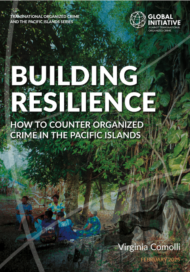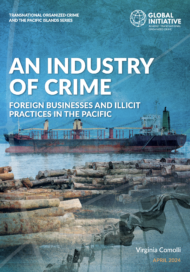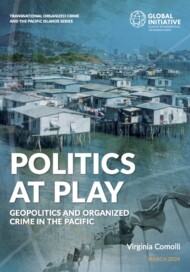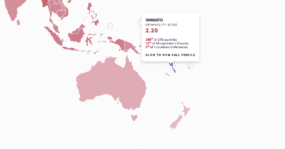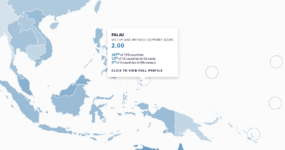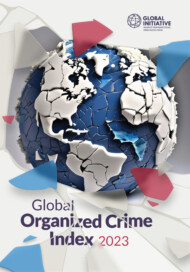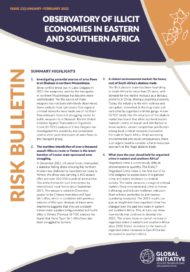Posted on 26 Feb 2025
The GI-TOC’s Pacific Programme is mapping how organized crime is impacting the Pacific Islands and exploring the different criminal actors driving illicit activities.
Building and expanding on the analysis in the Global Organized Crime Index, the GI-TOC has undertaken to map trends in organized criminality in the Pacific (Oceania). The resulting papers contribute to filling some of the gaps in a region where crime-related data can be scarce. In turn, these analyses allow us to identify vulnerabilities as well as opportunities for intervention and mitigation.
The Pacific islands now occupy a more prominent place on the international strategic chessboard as a result of the proliferation of trade, diplomatic and security engagements in the region in the 21st century. This is due to greater foreign presence and influence in Micronesia, Melanesia and Polynesia, and intensifying geopolitical competition among external partners. This reality, alongside greater connectivity and market trends, is also drastically transforming the criminal landscape.
Pacific islands have traditionally been considered as mostly immune from high levels of criminality due to their geographic remoteness. However, highly pernicious illicit markets are taking hold, and the islands are becoming increasingly vulnerable to new threats in the form of cyber-enabled and cyber-dependent crimes and the introduction of new narcotics, to mention just two examples.
Who is behind these activities?
There are multiple criminal actors present and active in the Pacific islands, but the most pervasive are foreign actors. And within the foreign actor sub-set, there are a diverse array of nationalities and sectors. The one thing they have in common is their pivotal role vis a vis evolving crime dynamics.
Across the series of papers, we map their different typologies. The emerging pictures suggests that, possibly contrary to expectations, business operators are often responsible for the bulk of organized criminality. This is particularly evident in the extractive industries, but also in sectors such as real estate and financial services. Yet, more ‘obvious’ criminal actors such as cartels and triads have also made their way to the islands and intensified their operations.
Informed by extensive on the ground interviews, the actor mapping underlines the ever more complex identities exhibited by certain individuals who operate in both the licit and illicit economies, and entertain political connections both at home and in the Pacific. The activities of this latter category of actors require particular scrutiny. The perpetrators can become tools of foreign political influence and interference and this awareness ought to inform the way in which responses to crime are designed and implemented.
Politics at play. Geopolitics and organized crime in the Pacific
The first paper is a scene-setter. This policy brief teases out the geo-political and geo-strategic considerations driving the renewed foreign interest in the Pacific islands while, in parallel, exploring the factors that have been transforming organized crime in the region over the past couple of decades. They include, among others, global trends in globalisation, connectivity and technological advances, as well as regional ones such as rising demand for drugs for the lucrative Australian and New Zealand markets, the influx of criminal deportees and outlaw motorcycle gangs and China’s initiatives stemming from its economic, security and political priorities.
An Industry of Crime: Foreign businesses and illicit practices in the Pacific
Following the opening policy brief, a research report zooms in on the private sector. Foreign companies and entrepreneurs from different sectors and backgrounds have deepened their involvement in the islands. Legitimate business activities are often conducted in parallel with illicit ones, which in some cases amount to the bulk of revenues generated. These businesses, many of which are of Asian origin, have been able to exploit favourable tax regimes, limited monitoring and enforcement capabilities and, in certain cases, corrupt local partners and enablers, to increase their profits through illicit means. Diplomatic relations between their countries of origin and the Pacific countries in which they operate, can grant a high level of political access to these businesses and result in preferential treatment.
The study details four broad categories into which private sector criminal actors in the Pacific can be grouped:
• Environmental sector operators (fishing, logging and mining)
• The embedded diaspora
• Absentee residents
• Schemers and scammers
A crowded space: Foreign organized crime groups in the Pacific Islands
The variety of foreign criminal actors active in Pacific islands suggests the region has ‘graduated’ from a mere transit region for illicit flows to a more prominent set for transnational criminal activities involving groups from different corners of the world. They are the focus of a dedicated report.
The trade in cocaine, synthetic drugs and heroin is what arguably drives most (albeit not all) more traditionally-defined organized criminals to the Pacific. Despite the presence of some minor actors, e.g. from Eastern Europe, three groups stand out:
• Triads and Asian syndicates
• Central and South American cartels
• Outlaw motorcycle gangs from Australia and New Zealand
Building resilience: How to counter organized crime in the Pacific islands
The last paper in this initial series offers a set of reflections on the ways in which geopolitics impacts responses to foreign-driven criminality and puts forward recommendations for policymakers and other practitioners.
At the heart of this policy brief, and the common thread in the series, is the recognition that the actions of foreign actors result in direct and indirect implications for Pacific communities as well as for victims of crime further afield.
Hence, ignoring or de-prioritising tackling criminal threats in favour of other diplomatic or economic agendas risks further exacerbating local fragility and allows for the establishment of safe havens for illegality from which foreign criminals can operate unhindered.
